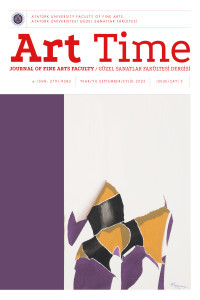Tanrı’nın Tesellisi
Bu yazının amacı, kutsal kitap İncil’de dile getirilen ‘Tanrı insanları teselli eder’ ve ‘Ben dünyanın
ışığıyım. Benim ardımdan gelen, asla karanlıkta yürümez, yaşam ışığına sahip olur’ ilahi metinleri
yorumlayan Meister Eckhart’ın, bu konuya yaklaşımını incelemek ve irdelemektir. Eckhart özellikle
yaratılanların kendisinden gelen teselli ve Tanrı’dan gelen teselli olmak üzere iki farklı teselli çeşidi
üzerinde durmaktadır. Ona göre yaratılanların tesellisi eksik ve mükemmel değildir. Buna karşın
Tanrı’nın tesellisi içine hiçbir şey karıştırılmamış olduğundan saf ve mükemmeldir. Bu bağlamda
Eckhart açısından yarattıklarını hiçbir zaman unutmayarak ve aksatmayarak destek veren Tanrı;
koruyan, neşelenen, acı çeken, kutsayan ve tüm mutluluğun kendisinden aktığı, teselli eden bir
Tanrı’dır.
Divine Consolation
The purpose of this article is to examine the approach of Meister Eckhart, who interprets the
divine texts that are expressed in the Bible, “the God of all consolation” and “I am the light of the
world. Whoever follows me will not walk in darkness, but will have the light of life.” Eckhart emphasizes
two different types of consolation, especially the consolation from the creatures themselves
and the consolation from God. According to him, the consolation of human beings is incomplete
and not perfect. However, the divine consolation is pure and perfect, since it is not mixed with
anything else. In this context, Eckhart believes that God supports his creations by never forgetting
or failing and it is God that protects, cheers, suffers, blesses, and consoles, from whom all
happiness flows.
Keywords:
God, Jesus, suffering, consolation, happiness,
___
- Book of Sirach (Sirak Kitabı) (2006). Kutsal kitap, eski ve yeni antlaşma. Yeni Yaşam Yayınları.
- Davies, O. (2004). The unspoken word: Negative theology in Meister Eckhart’s German Sermons. Journal of the History of Philosophy, 42, 3.
- Eckhart, M. (1994). Selected writings, selected and translated by Oliver Davies. Penguin Books, Ltd.
- Exodus (Mısır’dan Çıkış) (2006). Kutsal kitap, eski ve yeni antlaşma. Yeni Yaşam Yayınları.
- Field, C. (1909). Meister Eckhart’s sermons. H. R. Allenson, Ltd.
- Fox, M. (1980). Breakthrough: Meister Eckhart’s creation spirituality. In M.
- Fox (Ed.) New Translation, Introduction and Commentaries Books. O. P. Image Books A Division of Doubleday and Company Inc.
- Genesis (Yaratılış) (2006). Kutsal kitap, eski ve yeni antlaşma. Yeni Yaşam Yayınları.
- Guénon, R. (2005). Hristiyan mistik düşüncesi (İ. Taşpınar, Çev.). İnsan Yayınları.
- Isaiah (Yeşaya) (2006). Kutsal kitap, eski ve yeni antlaşma. Yeni Yaşam Yayınları.
- John (Yuhanna) (2006). Kutsal kitap, eski ve yeni antlaşma. Yeni Yaşam Yayınları.
- Kahveci, K. (2014). Bir mistik düşünür: Meister Eckhart. Atatürk Üniversitesi Yayınları, Eser Basın Yayın Dağıtım Matbaacılık.
- Kieckhefer, R. (1978). Meister Eckhart’s conception of union with god. Harvard Theological Review, 71(3–4), 203–225. [CrossRef]
- Koterski, J. W. (2003). The mistical thought of Meister Eckhart: The man from whom god hid nothing, Theological Studies, Proguest religion.
- Matthew (Matta) (2006). Kutsal kitap, eski ve yeni antlaşma. Yeni Yaşam Yayınları.
- McGinn, B. (1981). The god beyond god: Theology and myticism in the thought of Meister Eckhart. Journal of Religion, 61(1), 1–19. [CrossRef]
- Politella, J. (1965). Meister Eckhart and eastern wisdom. Philosophy East and West, 15(2). [CrossRef]
- Psalms (Mezmurlar) (2006). Kutsal kitap, eski ve yeni antlaşma. Yeni Yaşam Yayınları.
- Radler, C. (2005). For he beloved: Mystical marriage in Meister Eckhart and Sister Catherine.
- Sena, C. (1975). Filozoflar ansiklopedisi, E –H, Cilt: 2. Remzi Kitabevi.
- Smith, L. (2008). The teaching paths of Meister Eckhart CSJ.
- Başlangıç: 2021
- Yayıncı: Atatürk Üniversitesi
